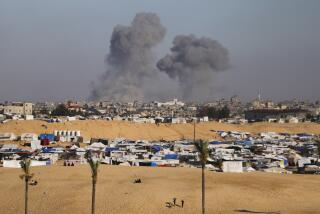Nunn Pushes Administration for Limits on Nuclear Testing
WASHINGTON — The chairman of the Senate Armed Services Committee bluntly told the Bush Administration on Tuesday that it must further limit U.S. nuclear testing on its own or Congress will impose a moratorium that might contain more stringent restrictions.
The warning by Sen. Sam Nunn (D-Ga.) was considered likely to heighten prospects for congressional enactment of some sort of moratorium. The House voted overwhelmingly earlier this year to impose a one-year ban on such testing, and 53 senators are backing a similar plan.
Although President Bush might well veto such legislation, enactment of a moratorium would be a political setback for the Administration, which has steadily opposed any further cutbacks despite the dissolution of the Soviet Union and agreement on arms-reduction pacts.
Defense Secretary Dick Cheney and Joint Chiefs of Staff Chairman Gen. Colin L. Powell reiterated that stand on Tuesday in testimony before the Armed Services Committee. Powell said continued testing was essential to ensure the safety and reliability of nuclear weapons.
But Nunn, while agreeing that some testing should continue, complained that the Administration’s insistence on continuing full-scale testing of nuclear weapons was a policy that had outlived its merit in light of the Soviet Union’s demise.
Nunn called Cheney’s defense of full-scale testing “a little bit out of sync” with today’s realities.
The United States has reduced its nuclear testing program significantly in recent years, cutting back both the number and size of such tests and increasingly relying on computer simulations to discover possible problems in nuclear weapons.
The Bush Administration, seeking to head off the test-ban legislation, promised Congress in July that it would limit the number of tests to six a year for the next five years and would conduct them only for safety and reliability, not to help in developing more modern weapons.
Those backing a moratorium on nuclear testing argue that it would decrease the threat of radiation and a possible nuclear accident, and might help persuade Third World countries to accept international non-proliferation limits.
More to Read
Get the L.A. Times Politics newsletter
Deeply reported insights into legislation, politics and policy from Sacramento, Washington and beyond. In your inbox three times per week.
You may occasionally receive promotional content from the Los Angeles Times.










